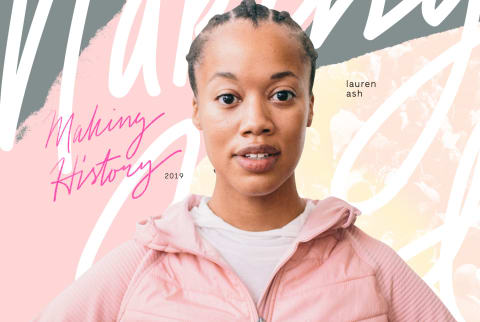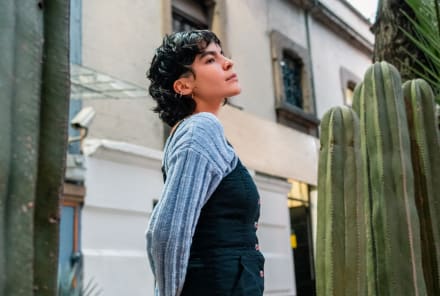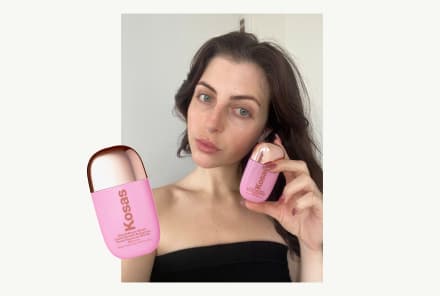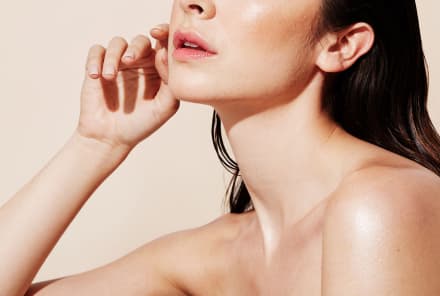Advertisement
Lauren Ash On Creating Diverse Wellness Spaces, Healing & Changing Consciousness


How did you start Black Girl in Om?
It was very organic. [It was] really just me navigating my own yoga practice and wellness journey... and noticing what was and wasn't present around me. What wasn't present were other women of color and black women specifically, both practicing alongside me and also leading and directing and holding the space. And then, of course, because I'm a perpetual optimist [and carry] the legacy of my ancestors, who were always creating powerful things out of nothing, out of the scraps someone else left behind, I also recognized that what was there was opportunity and possibility. Some folks look at a situation that they don't find ideal or find to be problematic in some way and say, "I'm going to leave and go over here," but I didn't have an option. There wasn't an "OK, so I'll just leave the white yoga space and go to the brown yoga space." I didn't have access to that where I was. Right after completing yoga teacher training with a whole lot of excitement and enthusiasm, I started to hold space in a really beautiful, and dear friend and mentor of mine's, space. I met her shortly after completing yoga teacher training. I told her about my initial vision for Black Girl in Om, which was a phrase that had come to me very divinely in a yoga practice in the middle of yoga teacher training. And she was like, "Great! When do you want to start?" It was organic, very much divine, and had a snowball effect, and since then it has only grown.
What changes have you seen in the Black Girl in Om community since you started? Are you seeing more black women getting into yoga, into meditation, into self-care?
I think there's the obvious, which are the things that you just said. But I think there's also the more subtle and actually more powerful, which is changing mindset and consciousness. It's a conversation I am way more interested in having. We're changing our mindset around what is possible for us, what's accessible for us, and what is going to really heal us on a level that relates to us in the present, the future and the past. There are a lot of conversations around intergenerational trauma, and we need to be having these conversations. Something I've been hearing and talking about more is intergenerational healing—the fact that we are healing ourselves and taking up different practices that support our well-being and, especially, mental health. That not only allows us in the present moment to be well and sustained, but it will also forever affect the generations that come after us. The conscious choices that I make to heal myself now are forever imprinting themselves on the DNA of the future. Which is profound. We're not just the sum of our traumas; we're also the sum of our healing.
We know the mainstream wellness industry has a diversity problem. How can it affect someone from a marginalized group to enter a predominantly white space and not see themselves?
If you don't see yourself represented, you can think a few things: No. 1, that that activity or space isn't for you. I, personally, don't really follow the rules. I'm not someone who goes to a space, doesn't see myself, and then thinks that it's not for me, but many people do. I'm just like, "I'm going to be here. I'm going to come back." But a lot of people would go and never go again because they're like, "Well, there are no other black women, so why would I come back?"
Teaching and holding space for black women, I hear everything. I've heard from a black woman who, at her Harlem yoga studio that she's gone to for years, has had white women throw their towels at her afterward to clean up and ask questions about why she wears a headscarf. People don't need to be experiencing that and especially not within a space that's supposed to be where we're getting our Om on.
It just takes away creative possibilities for where we can be and the quality of our being within that space. Am I in the space on edge? Because then I might as well just not even go. Or am I in the space, feeling like I can bring my full, authentic self and that my full, authentic self will be embraced and not questioned?
What isn't mainstream wellness talking about that it should be talking about?
This question is always so funny to me because, increasingly, I am a part of it, but I'm also not. So much of my work centers on black women, and so many of the people that I collaborate with are black women, and we're all doing the same stuff. So, I have to zoom out and think about [mainstream wellness] in a whole different way. And I'm like, "What are they doing?"
Black Girl in Om is like a "by us, for us" approach and space. But there is something that I'm really sincerely interested in happening, which is greater inclusivity and true diversity within the wellness space on the mainstream. I like to have my BGIO Self-Care Sundays with my black and brown women in community. But I also like to know that if I go to my local yoga studio that I'm not going to be the only one. I feel like both things should be happening.
What have you been hearing directly from black women since starting Black Girl in Om? What feedback have you received?
I've had a woman say, "Wow, because of you I realize that wellness is for me, and my life has changed." I've had women reach out and say that they became yoga teachers because of finding Black Girl In Om and they would have never considered that as a path, and it's brought them so much joy and healing, as well as the people that they serve. So, literally directly increasing the representation of black and brown women in the wellness space, which is phenomenal. Also, [there are] people who feel inspired to insert themselves into creative possibilities that they never imagined for themselves. A lot of my story is related to imagining myself in a space that didn't even exist. We don't really get taught that. So, by me sharing my journey, people can learn and say, "OK, well, that's the best practice. Let me try that and see what happens." We're re-imagining what we feel is possible for ourselves, both on a personal development level, as well as lifestyle and career.
What does your personal wellness routine look like today?
I can tell you what I did this morning. I'm actually at my best girlfriend's house for the weekend. I woke up in a new place, and, especially when I'm in a new place, it's important that I just really ground myself in that space. We live in a very distinct time, when we can just go somewhere completely different in a few hours. The body needs to be calmed after that, needs to be nourished. So, I just drank a bunch of water and some tea, put on some music, and I meditated for 20 minutes. Then I pulled some intuitive cards to set some intentions for the day. What is surprising, because I'm an entrepreneur, is I finally am at the place where I do not look at my phone before I do my self-care practices. That's a huge win for me. I actually turn my phone off at night, and I have my phone on "do not disturb" all day, so I don't get notifications about anything.
After the meditation as the intuitive work, I usually journal three pages and whatever comes up, comes up. Or/and I will also bullet journal. I just started bullet journaling at the top of this year, as a way to integrate all these seemingly separate aspects of myself, my personal life, my personal brand, my business, Black Girl in Om. All the meetings and client work are all in one place. So I set myself up for success by identifying at the top of every day what is a priority today. What did I not get to yesterday? It really allows for ease. So I don't just open up my inbox and respond to people that are trying to demand my time, but I'm really taking ownership over my time for me. And I'm shifting into greater intention around how I wind down because I am usually on 10 all day. I have noticed that I don't get great sleep if I don't approach going to bed with the same mindfulness that I approach greeting the day with.
So, you have your phone on "do not disturb" all day. As an entrepreneur, was there a learning curve going from having notifications to not?
I did feel anxious about it. I did feel nervous about it. I wondered what people would think. But that honestly is down the drain now. I feel amazing, I feel sustained, and I feel exactly all the things that I always wanted to feel but didn't know how before. To me, fundamentally, this boundary that you're pointing to is all about self-love. If I love myself as a person—not considering myself as the founder of Black Girl in Om, not considering myself as someone who has a lot of client work in partnership for my personal brand, all these external identities of who I am—if I just love myself as a person, that means that I'm not going to open myself up to other people's whims for how my time is used. That inherently leads me to exhaustion, feeling depleted, feeling frazzled, feeling anxious. If I love myself, I'm going to put up these things in my life that allow me to be sustained and actually allow me to do my work.
How has your wellness practice for yourself changed since starting Black Girl in Om?
It's gone from surface to deep, and it wasn't because of any conscious effort initially. The more I have remembered that part of my mission on Earth is to hold space for black women, in particular, to journey deeper into their own healing, that always starts with me journeying deeper into my own healing. I had recurring reminders literally every year like clockwork. It just happens, where I get the rug pulled out from under me, and it's like, OK, this is going to be when you learn about forgiveness for the 17th time because you seem to have forgotten, and you're going to go deeper this time. Or this is going to be the year you really admit new traumatic things that happened to you that you've just been telling yourself that didn't matter. Or this is going to be the year that you learn how to release things that no longer serve you, because why are you hanging on to that thing? It's been a series of divine reminders that really have allowed me to go from surface level wellness (which is very popular) to, "You will get this healing."
And that's what I think resonates so strongly. That's why so many black women, especially young black women, reach out and thank me because they're seeing, especially when I share about it, that that's what matters–when you're able to share your process around what healing actually looks like in that vulnerable space, that alone can just be healing. That's why I speak up and share the experiences that I have. I have gotten more comfortable with stripping away facades.
What can mainstream wellness do to start addressing this diversity problem?
If we're talking about actual change, then hiring black and brown people who can be spearheading the initiative. It's not going to happen if you continue to hire white women who do white women wellness things—period. Start there. Give your money and give your resources to marginalized people in the space. I have a true white ally and friend who has been supporting my work in a radical way, and it looks like giving money, and it looks like giving space, and it looks like sitting down and giving the platform for another voice to speak—another voice that doesn't usually get the space to speak.
What's next for you and Black Girl in Om? What do you envision for your community and your work?
Deeply immersive, transformative experiences in person. Retreats, things like that, as well as in the digital space, which we've already been doing, but just elevating it and taking it to the next level. And for myself, it's still very much in the early stages, but writing my book, sharing my story.
How can people support Black Girl in Om?
If you are a white ally and love Black Girl in Om, you can share about the platform with your black and brown sisters. We have a number of people who are white and who listen to the podcasts and the articles and share that, "I'm not a person of color, but I really love it." Great! Are you also sharing it with people that you know? And are you using the information that you receive from our platform to actually do some real change?
And in general, space. We are looking to do more national events in Los Angeles, New York, Atlanta, D.C., Chicago. If you have access to a beautiful space and you would love to host, reach out.
Watch Next
Enjoy some of our favorite clips from classes
Enjoy some of our favorite clips from classes
What Is Meditation?
Mindfulness/Spirituality | Light Watkins
Box Breathing
Mindfulness/Spirituality | Gwen Dittmar
What Breathwork Can Address
Mindfulness/Spirituality | Gwen Dittmar
The 8 Limbs of Yoga - What is Asana?
Yoga | Caley Alyssa
Two Standing Postures to Open Up Tight Hips
Yoga | Caley Alyssa
How Plants Can Optimize Athletic Performance
Nutrition | Rich Roll
What to Eat Before a Workout
Nutrition | Rich Roll
How Ayurveda Helps Us Navigate Modern Life
Nutrition | Sahara Rose
Messages About Love & Relationships
Love & Relationships | Esther Perel
Love Languages
Love & Relationships | Esther Perel











